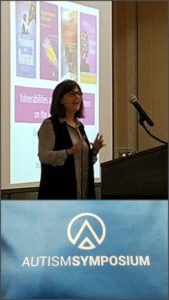By: Lynne Mollo, LCSW
Primary Therapist
I was honored to begin the celebration of Autism Awareness month with a group of Educational Consultants, Wilderness therapists, Social Workers, Psychologists, Doctors, Parents and many other professionals working with children and adults on the Spectrum.
On April 2nd and 3rd Asheville North Carolina was host to the 4th Annual Autism Symposium sponsored by several programs in the therapeutic education field. The symposium’s focus was to have a place where professionals could come together and better understand the best practice when dealing with Autism.
A panel of therapists, parents, medical doctors and other professionals answered thought provoking questions from the audience on how to best serve clients and families with Autism Spectrum Disorder (ASD).
Some of the questions asked of the audience included:
- Why are there more boys than girls diagnosed with Autism?
- What are the causes of Autism?
- Why are the numbers increasing?
- What are the best ways of supporting people with Autism?
The overall summary of the panel discussion was that there are more questions than answers and more research is needed to understand how to best identify and improve the lives of those touched by ASD.
Dr. Liane Holiday Willey, EdD began the second day of the conference with a witty, interesting and honest presentation entitled “Vulnerabilities and support of women on the Autism Spectrum Disorder”. Not only has Dr. Willey authored several books on the topic of Autism, she herself was diagnosed with Autism at the age of 35 by one of the leading experts in the field, Dr. Tony Attwood. Liane has been a strong advocate for those on the Spectrum and provides support and information on her website blog Aspie.com.
One of the most applicable things she mentioned was how helpful and effective horticultural therapy is for people with Autism. She recommended having a garden (or “even just a pot with something growing in it!”) as an easy, accessible way to help individuals with Autism regulate their emotions. She also noted the high effectiveness rates for horticultural therapy. This speaks to how powerful this intervention is and also why it is so fundamental in our approach at Pacific Quest!
After a meet and greet lunch with a group of professionals and parents all the participants were able to join in on several breakout sessions for the rest of the day. I chose to attend the two sessions that addressed the neurological aspects of ASD. First, I attended an experiential session by Cameron Allen who was diagnosed with Asperger’s syndrome as a teen. He found that neurofeedback supported his development and now is a specialist with a private practice. He and Taisir El-Souessi, LPC facilitated activities that showed how a person on the spectrum might be processing information. The last breakout session I attended was a collaborative case study presentation of a young adult on the spectrum. The professionals walked the audience through this young man’s journey to independence. In the end this young man was able to identify when he was Limbic Dominant. The research presented identified that the limbic system grows super fast in the brain of a person with Autism.